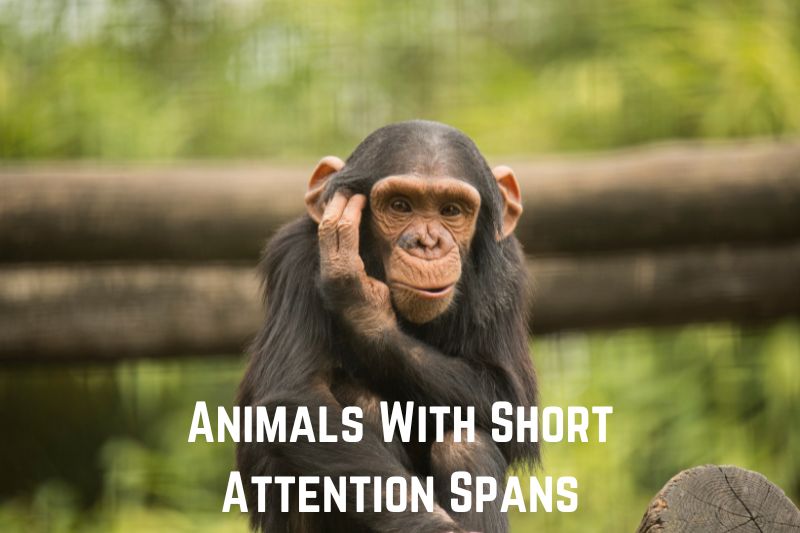You might have noticed your pet cat or dog becoming easily distracted by new sights, sounds, or scents. This behavior isn’t limited to household pets – many animals in the wild exhibit such short attention spans too. In fact, some species are known for their fleeting focus, which can be both endearing and perplexing.
This article will explore the 13 famous animals for their short attention spans. As you dive into the fascinating world of these creatures, you’ll learn about their unique characteristics, how their attention spans benefit them, and gain a deeper appreciation for the diverse ways animals navigate their environments.
So, get ready to meet these easily distracted critters and uncover the reasons behind their seemingly flighty behaviors. Make sure to pay attention because these animals certainly won’t!
Read: 13+ Most Hairiest Animals in the World (+Pics)
Contents
Why Do Animals Have Short Attention Spans?
There are a few reasons why animals might have short attention spans. Let’s explore some of these factors:
Evolutionary advantages: Having a short attention span can be beneficial in the wild. It allows animals to quickly shift their focus and remain vigilant for potential threats or opportunities.
For example, prey animals need to be constantly alert to the presence of predators, and having a short attention span might help them avoid becoming the dinner.
Foraging: Searching for food requires animals to navigate complex environments and explore various options. A short attention span can help them switch between tasks, maximizing their chances of finding food.
It’s advantageous for animals to search multiple spots or change their approach based on the availability of resources.
Stimulation: Like humans, animals require mental stimulation to stay engaged and interested. A lack of stimulation could lead to boredom, making it harder for animals to focus on a single task. Engaging toys or puzzles can help boost their focus and keep them mentally sharp.
Individual variability: Just like humans, animals have individual personalities and temperaments. Some animals might naturally have shorter attention spans than others. Breed and genetics can also play a role in determining how easily an animal focuses on a particular task.
Remember, having a short attention span isn’t always a bad thing. Animals have evolved to be adaptable and flexible; sometimes, having a shorter focus can help them survive in their environment.
However, understanding why animals have short attention spans can help you better support and accommodate their needs in a domestic setting.
13 Wondrous Animals With Short Attention Spans
1. Chimpanzees

You might find it surprising that chimpanzees have quite a short attention span. This playful and intelligent creature may seem very focused at times, but their attention span tends to wane quickly.
When you observe chimpanzees in their natural habitat, you’ll notice how they easily shift between grooming, foraging, and play-fighting activities. This variable behavior showcases their inability to focus on one task for extended periods.
Despite their short attention span, chimpanzees are immensely skilled in learning new skills, solving problems, and even remembering the faces of their fellow chimps. Their cognitive abilities are quite remarkable, given that they share around 98% of their DNA with humans.
So, how can a creature as bright and capable as a chimpanzee have such a fleeting attention span? Interestingly, it’s thought that this trait could be an adaptation to their fast-paced lifestyle, which demands frequent scanning and responsiveness to their environment.
Knowing more about the short attention span of chimpanzees sheds light on these fascinating creatures. It also serves as a reminder of the incredible biodiversity that exists within the animal kingdom and the unique characteristics that make each species so remarkable.
2. Fruit Flies

Fruit flies are tiny creatures with an impressively short attention span. You might have encountered them buzzing around your kitchen, seeking sweet fruits and vegetables. They are known for their brief lifespans, contributing to their fleeting focus.
The attention span of a fruit fly lasts only a few seconds, allowing it to adapt and react to its surroundings quickly. This can benefit them as they scurry from one food source to another.
Fruit flies are fascinating research subjects, as their brief attention spans provide insights into cognitive processes. Studies have shown that these insects can, in fact, learn and retain information, but their limited focus makes it challenging for them to process new experiences.
3. Rabbits

You might be surprised to learn that rabbits have quite a short attention span. Their constantly alert nature and the need to be on the lookout for predators contribute to their inability to focus for long periods of time. Because of this, they can become easily distracted and may not always follow through on a particular task or activity.
As you observe rabbits, you’ll notice them frequently twitching their ears, scanning their surroundings, and slightly adjusting their positions to detect potential dangers better. This behavior is essential for their survival but can make it difficult for them to concentrate.
However, it is worth noting that rabbits are intelligent animals capable of learning tricks and responding to their names. When training a rabbit, it’s important to keep sessions short and sweet to accommodate their limited attention span.
Breaking down tasks into small, manageable steps and maintaining a patient and friendly approach will yield the best results.
In a home setting, offering your rabbit a stimulating environment with a variety of toys and hiding spots can cater to their need for frequent activity. It’s crucial to meet their social and emotional needs by providing companionship and daily interaction.
4. Squirrels

Squirrels are cute, energetic animals often seen in your backyard or parks. You might have observed that they are constantly on the move, searching for food, and playing with each other. This is because they have short attention spans.
Due to their high metabolism, squirrels need to eat a lot. You’ll see them tirelessly searching for food to stash away for later use. Their short attention span drives this constant foraging behavior, as they can easily become distracted by other squirrels, predators, or just the slightest noise or movement in their environment.
Despite their brief focus, squirrels show surprising memory skills when locating their hidden food caches. They use a technique called “spatial chunking” to organize and remember the location of their food, allowing them to easily retrieve it later.
5. Magpies

Magpies are known for their striking appearance and high intelligence, but did you know that they also have a short attention span?
Firstly, it’s important to understand that magpies are inquisitive creatures, and this curiosity can lead to a short attention span. They’re always looking for new and interesting objects, so don’t be surprised if you see a magpie hopping from branch to branch or suddenly changing direction while they fly.
Another possible reason for their short attention span is their survival instincts. In the wild, magpies need to be constantly aware of potential predators, so their short attention span might be a way for them to remain vigilant in their environment.
This constant state of alertness means they need to quickly shift their focus from one thing to another, contributing to their reduced attention span.
Additionally, in a social context, magpies form close-knit communities and will often interact with one another. These social interactions are an essential part of their daily lives, and it’s not uncommon for magpies to join in a group activity, only to wander off after a little while. This social behavior may also contribute to their short attention span.
Read: 10 Most Dangerous Animals in Yosemite (+Pics)
6. Cats

Did you know that cats, our beloved furry friends, also have short attention spans? On average, a cat’s attention span lasts for about 5 to 15 minutes. This comes to play when you observe your kitty playing with toys or chasing after a laser pointer.
One possible reason behind their short attention spans is their predatory instincts. In the wild, cats must be alert and ready to switch their focus to catch their prey quickly. Domestic cats have retained these instincts, contributing to their seemingly easily distracted behavior.
Another fact about cats is that they experience multiple short bursts of energy during the day, known as “zoomies.” These bouts of activity also contribute to a cat’s short attention span. Their bursts of energy mean they are always looking for new challenges and potential prey to pounce on.
To keep your cat entertained and mentally stimulated, consider offering them a variety of toys and activities that cater to their short attention spans. Interactive toys, puzzle feeders, and regular playtime sessions will help keep your cat engaged and prevent boredom.
7. Pigeons

Did you know that pigeons have a short attention span? It’s true! Pigeons are known for their incredible ability to find their way home, but when it comes to focusing their attention, they can be quite forgetful.
One reason for their short attention span is their columbicola, or “fidgety” behavior. Pigeons are constantly preening, pecking, and bobbing their heads, possibly contributing to their lack of focus.
You may notice pigeons being easily distracted by their surroundings as you watch them. A small noise or movement can make them abandon their current activity and investigate their environment.
In the animal kingdom, pigeons are not unique in their short attention spans, but they belong to a select group of animals exhibiting this characteristic. Here are some other animals known for their short attention spans:
- Goldfish
- Domestic cats
- Rats
- Guinea pigs
- Hamsters
Despite their short attention spans, pigeons are still quite intelligent. They’re swift learners, capable of completing tasks in exchange for rewards.
8. Goldfish

Goldfish are often seen as the quintessential short-attention-span pets. They have a reputation for quickly forgetting what they were doing, sometimes as short as a few seconds. However, recent research has shown that their memories may actually last for weeks or months instead of the oft-quoted “3-second memory” myth.
As you observe your goldfish swimming around in their tank, you might notice them zigzagging, stopping and starting, or quickly changing direction. This behavior can be partly attributed to their limited attention spans, but it’s also a result of their scanning vision.
Goldfish have monocular vision, which means they look at their environment with one eye at a time, independently from each other. This way, they can effectively explore their surroundings.
Their short attention spans can be both an asset and a liability in the wild. On one hand, it helps them stay alert to potential predators, changing their focus quickly to react to new threats. On the other hand, it might make them susceptible to wandering into danger or forgetting a developed sense of caution.
To help your goldfish maintain a healthy level of stimulation and mental engagement, you can create an enriching environment by adding various objects and hiding spots in their tank. Changing these objects occasionally can keep your goldfish interested while challenging them to explore and adapt to new conditions.
9. Hamsters

Hamsters are known for their short attention spans, making them one of the top animals with this trait. As a pet owner, you might have observed your hamster easily distracted and frequently shifting from one activity to another.
Hamsters have minimal attention spans, which can be as short as a few seconds. When exploring, they love to scurry around and investigate every corner of their environment. While playing with their toys or burrowing in their bedding, your hamster’s curiosity often gets the better of them, causing them to lose focus.
To keep your furry friend entertained, offering them various stimuli in their habitat is essential. Here are some tips:
- Provide a spacious enclosure with multiple levels to encourage movement and exploration.
- Supply a variety of toys like exercise wheels, tunnels, and chewable items to keep them occupied and mentally stimulated.
- Rearrange their habitat every few weeks to introduce novelty and challenge their problem-solving skills.
Moreover, hamsters have a natural sense of timelessness due to their crepuscular nature. They’re active during twilight hours, making it more difficult for them to pay attention to the duration of the activities and the environment around them.
So, when interacting with your hamster, remember their short attention span and try not to insist on long, continuous play sessions.
10. Dogs

Dogs, known for their loyal and affectionate nature, also have short attention spans. You may have noticed this while trying to teach your dog a new trick or during playtime. However, it’s essential to understand that the attention span of a dog can vary depending on its breed, age, and personality.
Some breeds, like the Border Collie, are more focused and have a comparatively longer attention span. On the other hand, breeds like the Beagle and Greyhound can be easily distracted. Remember that your dog’s attention span may improve with age and consistent training.
Consider breaking tasks into smaller steps when training your dog and using positive reinforcement techniques. Make the training sessions short and engaging to keep your dog interested. Limit potential distractions and offer rewards like treats or praise to help maintain their focus.
11. Parrots

You may be surprised to learn that parrots are known for their short attention spans. These colorful, intelligent birds, often kept as pets, can become easily distracted and lose focus on what they are doing.
Despite their remarkable ability to mimic human speech and solve complex problems, their attention span doesn’t help them focus on a single task for a long time. This is especially true for younger parrots, who tend to be more curious and active in exploring their surroundings.
To maintain a parrot’s interest in a task, providing them with plenty of mental stimulation is essential. This can include a variety of toys – such as puzzles, foraging toys, and chewable items – to keep them entertained and engaged.
Another helpful tip is to switch up their activities often, ensuring they don’t become bored or lose interest too quickly. For example, regularly introduce new toys and training methods so your parrot stays interested and challenged.
12. Ferrets

Ferrets are curious little creatures with boundless energy. They’re known for their playful manner and remarkable ability to entertain themselves, but their attention spans can be quite brief. As a result, you’ll often find them darting from one activity to another without warning or being easily distracted by new stimuli.
Part of this short attention span is due to their natural hunting instincts. In the wild, ferrets must catch their prey quickly and constantly look for potential threats. This translates into a busy lifestyle as a domesticated pet, where they require constant stimulation to stay happy and healthy.
Remember to keep various toys, tunnels, and hiding spots available for your ferret to explore. Rotate these items regularly to keep their environment fresh and interesting. This will help channel their attention and keep their active minds engaged.
Ferrets enjoy playing with other pets or even their own kind, which can help hold their interest for longer periods. Allowing your ferret to play with a companion can help satisfy their social interaction needs as long as everyone gets along.
Another way to engage your ferret’s short attention span is through training exercises. These intelligent animals can learn basic commands such as “come” and “sit,” as well as more intricate tricks like rolling over.
If your ferret is food-motivated, using small treats during training can help keep them focused and make learning new skills a fun experience.
Read: 10 Fascinating Animals With Big Cheeks (+ Pics)
13. Mice

You might be surprised to learn that mice have quite short attention spans. These tiny creatures are known for their curiosity and love of exploration. But, when it comes to staying focused on a task or object, mice have a difficult time.
Mice are constantly in search of new sources of food and shelter. They are always on alert for potential predators and threats. With all of these concerns running through their little minds, it’s no wonder that mice struggle to maintain focus for an extended period. Scientists have noted that mice tend to become disinterested in a stimulus much sooner than other animals in experiments.
This isn’t necessarily a bad thing for mice. Their short attention spans work to their advantage in the wild, as it helps them remain focused on survival. If they were to become too focused on one thing, they could miss out on opportunities for food or become easy prey.







